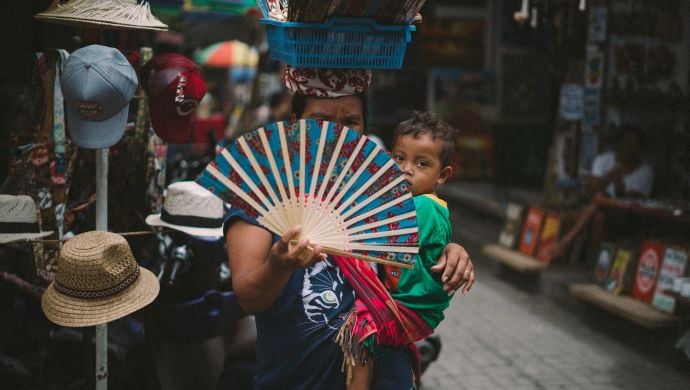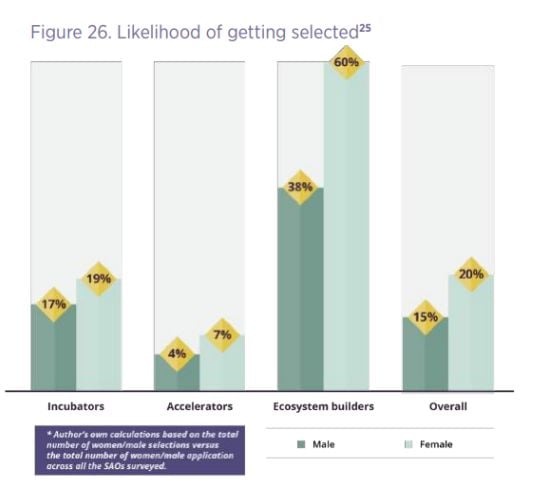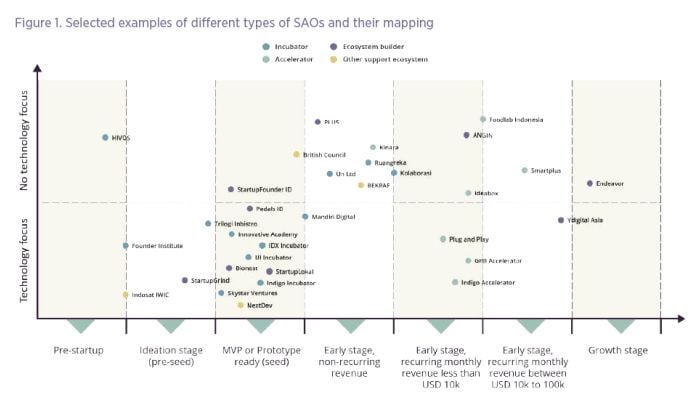A recent report by ANGIN and Sasakawa Peace Foundation looks at the state of gender inclusion in Indonesian incubator or accelerator programmes

Women-led ventures make up only 22 per cent of incubator or accelerator programmes participants in Indonesia, according to a two-part report written by Angel Investment Network Indonesia (ANGIN) and Sasakawa Peace Foundation.
Based on a research conducted between November 2017 and January 2018, the report identified 53 startup assistance organisations (SAOs) –incubators, accelerators, ecosystem builders such as hubs and coworking spaces, as well as other activities such as startup competitions and bootcamps– operating in Indonesia today.
With the goal to understand the role of SAOs in shaping entrepreneurial culture in the country, the report looked at the level of gender inclusion at these organisations.
It revealed that in recruitment stage, the number of women-led ventures participation is even lower at 17 per cent.
However, despite the low participation, women-led ventures actually have greater likelihood to be accepted into programmes, as seen in the following figure:

“We hypothesise that the difference in actual representation during the programme can be attributed to the fact that
women-led businesses have five per cent more chance than men to get selected into an SAO programme if they apply,” the report said.
Also Read: Cryptocurrency may be sexist, but it is for women, too
So why don’t these women-led ventures apply to such programmes? The second part of the report found that generally there are two reasons:
1. The perception that the entrepreneurial ecosystem is male-dominated
2. The lack of programmes that focus on women-dominated sectors such as food production, retail, professional services, and social services.
The report also identified the challenges faced by programmes in promoting greater inclusion. For example, in the recruitment process, programmes are struggling to reach out to potential talents, particularly in sectors that are known to have a low number of women participation such as ICT.
It also struggles to find women mentors, especially those who would be available to mentor in tier-2 and tier-3 cities in the country, since the majority of incubator or accelerator programmes in Indonesia are centralised in Java. Fourty-one out of 53 identified programmes are headquartered in Jakarta.
Women as entrepreneurs
In general, women in Indonesia have always played a great participation in building entrepreneurial community. Statistics varied depending on the institution that provides, but a 2016 data by IFC stated that there are 30.6 million women entrepreneurs in the country.
The same data also revealed that more than 50 per cent of these women entrepreneurs own micro enterprises and on average most of these are informal enterprises. While women own 52 per cent of all micro-enterprises in urban areas of Indonesia, they own only 34 per cent of the medium-sized enterprises.
As if confirming the statistics, the second part of the report also revealed that only 57 per cent of women-led participating startups reached the “next level of maturity.”
This may be related to the lack of gender lens approach used by most SAOs in Indonesia, where 78 per cent of them claimed to be sector- and gender-agnostic.
“Only four per cent (two out of 53) of SAOs … specifically focussed on women-led enterprises or applied a gender-lens approach in their selection processes. The two SAOs identified with a gender-lens mission target pre-seed and seed stage ventures led by women,” the report said.
“Meanwhile, none of the SAO respondents that target mid to growth-stage enterprises apply a gender-lens approach during their decision-making process,” it continued.
Also Read: Lies and statistics: How many of China’s women are actually in the tech sector?
SAOs in Indonesia
The lack of gender inclusion among SAOs in Indonesia can be attributed to the fact that such activities are relatively new to the market.
The report stated that SAO activities in Indonesia may have started before 2010; but specifically, accelerator-type organisations have begun to emerge in the country in 2010.
“However, we noticed that there are some uncertainties around the current operational status of some of the organizations that emerged before 2013. Furthermore, our data reflects that the majority of SAOs in Indonesia sprung up after 2013,” it stated.
SAOs in Indonesia are also described as being in a “state of flux” where organisations continue to evolve, improvise, and trying out new structures or models.

But what is the attitude of SAOs when it comes to gender diversity? Generally, the report confirmed that SAOs are keen to have more women-led ventures on-board their programmes, particularly in tech-based sectors.
They also expect to see more government participation in sectors with low women participation such as ICT; to have a clear guideline on impact metrics, especially on gender-inclusiveness; and to create better post-programme evaluation methods for transparency and tracking the growth of startups, particularly women-led ventures.
Solutions
So what can the tech industry do to ensure a greater participation of women in SAOs?
The first part of the report laid out four recommendations:
1. Increased transparency on SAOs’ performance and gender-segregated data
2. Collaboration and consolidation
3. Public and private sector support
4. Promoting more women in ICT
“We believe that there is a need to address gender inclusivity in the entrepreneurial ecosystem because an increase in new women-led ventures and the longevity of existing ones can lead to a more prosperous economy,” the report stressed.
—
Image Credit: Tbel Abuseridze on Unsplash
The post Women-led ventures make up only 22 per cent of accelerator participants in Indonesia: Report appeared first on e27.